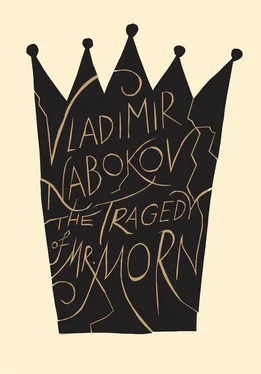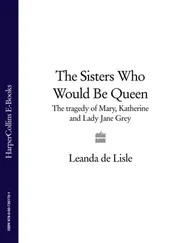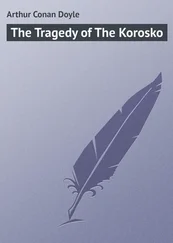Vladimir Nabokov
THE TRAGEDY OF MISTER MORN
With an Introduction by Thomas Karshan
Translated by Anastasia Tolstoy and Thomas Karshan
Contents

Introduction by Thomas Karshan
THE TRAGEDY OF MISTER MORN
Dramatis Personae
Act 1
Scene I
Scene II
Act 2
Act 3
Scene I
Scene II
Act 4
Act 5
Scene I
Scene II
Further Reading
A Note About the Author and the Translators
Other Books by This Author
Introduction

The Tragedy of Mister Morn was Vladimir Nabokov’s first major work, and the laboratory in which he discovered and tested many of the themes he would subsequently develop in the next fifty-odd years: the elusiveness of happiness; the creative and destructive playfulness of the imagination; courage, cowardice, and loyalty; the truth of masks; the struggle of freedom and order for possession of the soul; the sovereignty of desire and illicit passion; and what one character calls “that likeness which exists/between truth and high fantasy” ( I.ii.), a likeness under whose inspiration Nabokov would take reality, fancy, art, and impossibility, and twist them together into the four-dimensional knots of Lolita, Pale Fire , and his other great novels.
Yet Morn , which Nabokov wrote in Prague in the winter of 1923 to 1924, when he was only twenty-four years old, was never performed or published in his lifetime, though several readings of the play did take place in Berlin, then Nabokov’s home, in the spring of 1923. The opportunities in Berlin for staging a Russian play by a nearly unknown writer were limited, and publication cannot have seemed financially attractive to the émigré publishing houses that would later print Nabokov’s novels. In America, and then in Switzerland, Nabokov translated most of his Russian fiction, but not his early plays, and when he died, in 1977, the typescript and fair copy of Morn still lay dormant in his personal archive in Montreux. Then, in 1997, Zvezda , a Russian literary journal, published the complete Russian text of Morn; and in 2008 the play finally became available to a wider (Russian-reading) audience when a revised version of the text was published in book form by Azbuka Press of St. Petersburg. These publications have in turn made possible this current edition—the first translation of Morn into English.
While Morn is in many respects the seedbed for Nabokov’s major novels, there are also elements in it which are fascinatingly unlike anything in his later work, and which reflect issues in Nabokov’s life at the time of writing. Most prominent of these is revolution. Nabokov came from a distinguished liberal family in St. Petersburg: his father, V. D. Nabokov, had been one of the ministers in the short-lived Kerensky government which ruled between the fall of the Tsar and the ascent to power of Lenin and the Bolsheviks in 1917. That year, the Nabokov family fled St. Petersburg, first for Yalta, then for London, and, eventually, Berlin—where the young Nabokov would rejoin them in 1922, after completing his degree at Cambridge. Even in Berlin, however, the Nabokov family was not safe from the extremist ideologies of right and left which had vied for power in Russia after the failure of the liberal centre, and on March 28, 1922, Nabokov’s father was shot dead by a Monarchist assassin who was in fact aiming not at him but at another émigré politician.
Nabokov’s hatred of the Soviet regime is directly expressed in much of his writing, most prominently his novels Invitation to a Beheading (1935–36) and Bend Sinister (1947). But he would never again write anywhere nearly so directly about the moment of revolution itself, or so probingly about ideology, as he did in Morn . In the play’s two main revolutionaries, Tremens and Klian, Nabokov depicts a politics and poetics of nihilism which, it is implied, was the driving force behind the Russian Revolution. In this Nabokov was refining a critique of revolutionary ideology which can be traced back as far as Turgenev’s Fathers and Sons (1862) and Dostoevsky’s The Possessed (1872). He would articulate this critique again in his last, and greatest, Russian novel, The Gift (1937–38), whose fourth chapter is a mocking biography of Nikolai Chernyshevsky—the revolutionary thinker of the 1860s who was the object of Turgenev’s and Dostoevsky’s conservative critiques, and would become Lenin’s hero. But in Morn Nabokov explores more fully and explicitly than he ever would again what he saw as the origins of the revolutionary impulse in a death-instinct and passion for destruction. When Ganus, who had once been a revolutionary, returns from exile and discovers the happiness that the masked King has brought to the kingdom, he asks Tremens why he is not now satisfied. Tremens pours scorn on him. Neither happiness nor equality is Tremens’s purpose, he explains; rather, he is seeking to imitate the violent destructiveness of life itself, which “rushes headlong/into ash, [and] destroys everything in its way” ( I.i.). “Everything,” Tremens explains, “is destruction. And/the faster it is, the sweeter, the sweeter…” ( I.i.). To him, this destruction is beauty:
Did you see,
one windy night, by moonlight, the shadows
of ruins? That is the ultimate beauty—
and towards it I lead the world.
( I.i.)
Tremens cites as one aspect of that destructiveness the sexual drive itself, in the figure of “the maiden, who prays for the blow of a man’s love” (I.i.294), and one distinctive quality of the play is an unblushing erotic candour to which Nabokov would not fully return until Lolita (1955). Thus Klian, the violent-minded revolutionary poet who serves as Tremens’s factotum, tells his fiancée Ella that
…To enter you, oh, to enter,
would be like entering a tight and searing
sheath, to gaze into your blood, to break
through your bones, to learn, to grasp, to touch,
to press your being in between my palms!…
( I.ii.)
This anticipates Humbert Humbert in Chapter 2, Part Two of Lolita saying that “my only grudge against nature was that I could not turn my Lolita inside out and apply voracious lips to her young matrix, her unknown heart, her nacreous liver, the sea-grapes of her lungs, her comely twin kidneys.” Yet, as with so many aspects of the play, in the sphere of desire Nabokov explores opposite poles of experience. Against Klian’s dark vision of sexual appetite is set a more salubrious expression of love’s idealizing power—in the faith that Midia, and the other citizens, place in Morn’s nearly magical beneficence, and in Ella’s idea of love as a force that coalesces experience:
…all is one: my love and the raw sun,
your pale face and the bright trickling icicles
beneath the roof, the amber spot upon
the porous sugary snow mound, the raw sun
and my love, my love…
( III.ii.)
This, and the tenderly specific attention paid to the minutiae of Ella’s hair, clothes, and make-up, seem to attest to the fact that Nabokov wrote Morn soon after meeting and falling in love with Véra Slonim, who would become his wife—and the play’s typist. With her girlishness, humour, and idealism, Ella ranks alongside Lolita as one of Nabokov’s few fully realized female characters.
Читать дальше













